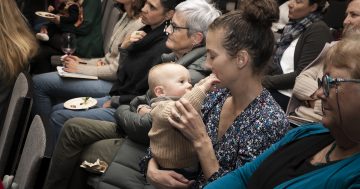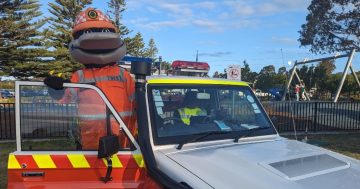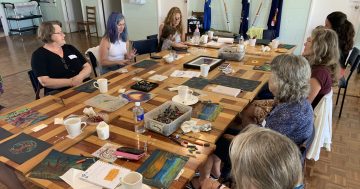
A mum breastfeeds on the beach during the Black Summer bushfires. Photo: Infant and Young Children in Bushfire Emergencies Project.
A project from the Eurobodalla could help the world’s most vulnerable people survive climate disasters.
The Babies and Young Children in the Black Summer Study (BiBs) report will launch on 23 June at the Eurobodalla Botanic Gardens.
Its authors, Dr Michelle Hamrosi and Dr Karleen Gribble, hope their findings will give community agencies, young families and emergency services the knowledge they need to protect babies, small children and their mums caught in disaster zones.
Dr Hamrosi, who is a GP and leads the Australian Breastfeeding Association (ABA) Eurobodalla group as a breastfeeding counsellor, said she was struck by the lack of guidance for young families during the Black Summer fires.
“There were no evacuation checklists available for young families,” she said.
“There were evacuation checklists, and ones for people with pets, but nothing for pregnant women or young families. So lots of families weren’t sure what they needed to bring, how long they should be prepared to evacuate for, or where to go.
“We’re talking about pretty extreme situations that people have never experienced before.
“When you’re under stress it’s very hard to make decisions, so people left things until the last minute and ended up evacuating later than they would have liked to.”
After the fires, Dr Gribble asked how the mums Dr Hamrosi works with had fared, and they were both concerned by the stories they heard.
The duo applied for a research grant, with the support of ABA, in the hope that the challenges faced by Eurobodalla families could improve disaster planning in future.
The application was successful, and they were able to survey and interview families, volunteers and emergency service workers about their experiences with young children and infants during the fires.
It became clear early on that small changes would have the potential to yield big results.
“Infants and young children are a group missing from disaster plans,” Dr Hamrosi said.
“There’s the general assumption that parents should be able to look after their young ones.
“But often women and children were turning up on their own to emergency centres, with limited resources, while dads stayed to defend the property, and those environments haven’t been made to consider young infants and children.
“Pregnant women and young children had to wait in hours-long queues for food and water or to check in to centres. For mums with small children, that’s almost impossible.”
That example might seem like an inconvenience or mild discomfort, but it can have dire consequences for babies.
Babies can become dehydrated from a lack of milk very quickly. That dehydration can quickly become fatal.
They also struggle to regulate their body temperature and cope with smoke-filled air in the same way adults can.
Because of the lack of support for breastfeeding, many mums were encouraged by well-meaning people around them to switch to formula.
The transition can be a tricky one at the best of times, but during a disaster it can be deadly.
“Some centres didn’t have the facilities to boil water for sterilising bottles, or there wasn’t reliable access to clean water,” Dr Hamrosi said.
“A baby who relies on formula in that environment is at high risk of becoming sick from contaminated water or dirty bottles.
“Nobody wants a baby to get sick in that situation.”
Dr Hamrosi acknowledged the Black Summer bushfires were unprecedented in scope and duration, but as climate change made similar disasters more likely and more frequent, it was imperative we took the opportunity to improve our response.
“I’m really passionate about people’s health and identifying what we can do to prevent health problems,” she said.
“So many people got damage from smoke, experienced psychological distress, children experienced asthma, infants had all sorts of problems from not having access to the right kind of feeding.
“Now we have an amazing set of data, unique in Australia, around what they need.
“If organisations can come together, if we can collaborate, we can better protect our future generation, our most vulnerable.
“The solutions aren’t complex, it’s not rocket science, it just takes a bit of time, effort and planning.”
One solution, successfully implemented at overseas evacuation centres, is to have a separate processing queue for people with immediate needs – such as a baby who hasn’t been fed for hours.
The shorter processing time doesn’t just mean baby gets fed.
In many cases, it also means breastfeeding is more likely to be maintained, and the potential of having to rely on contaminated water or formula is minimised.
“We really want to implement as many of the recommendations of our study as possible in our shire itself,” Dr Hamrosi said.
“Then we hope to influence planning and policy at a higher level, have round tables with decision makers in our region, work with them and invite other people to the table who are interested in this, particularly local health services.”
Health experts from New Zealand have already expressed interest in the report’s findings following a succession of climate disasters in Auckland and the upper North Island.
The report launch on Friday, 23 June, is open to everyone who took part in the survey, local families, community groups, emergency responders, and anyone who wants to improve support for families during bushfires.
The evening will include a 20-minute presentation followed by food and drinks.
Elder Iris White will conduct a Welcome to Country. Dr Hamrosi said the Botanic Gardens was a fitting venue for the launch.
“They’re such an iconic part of our shire, and volunteers have done amazing work to turn around the devastation from the fires,” she said.
To RSVP, head to the Facebook event page or email local project officer Kate.










